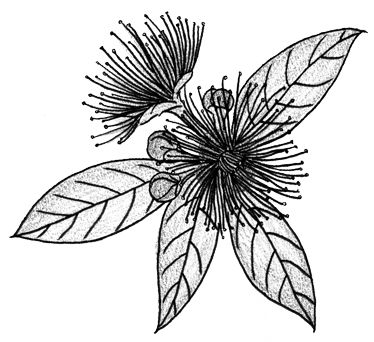ga2 na-ga naɣ̞a noun
La préparation du kava ✧ Preparing kava ✧ tēy na-ga
Lorsqu'il est frais (qay, opp. plastik), le kava est d'abord moulu (vigiy, wiyiy) par un jeune homme dont c'est la fonction pour un soir (n-et bē-tēytēy ga ‘préparateur de kava’) ; il utilise à cet effet une pierre de corail (ne-vet wiyiwyiy ga), ou auj. une moulinette. La poudre de kava obtenue est ensuite passée (bēs) dans de l'eau, et repose quelques instants dans un bol. Enfin peut commencer le moment calme où l'on boit le kava (inin ga, wan).
When it is fresh (qay, opp. plastik), kava has to be ground (vigiy, wiyiy) by a young boy (n-et be-pgipgiy ga). To this end, he may use a coral stone (ne-vet wiyiwyiy ga). The grinding yields a gray matter which is then left to infuse (bēs) in fresh water. After a while, men can start enjoying the quiet moment of kava-drinking (inin ga, wan).
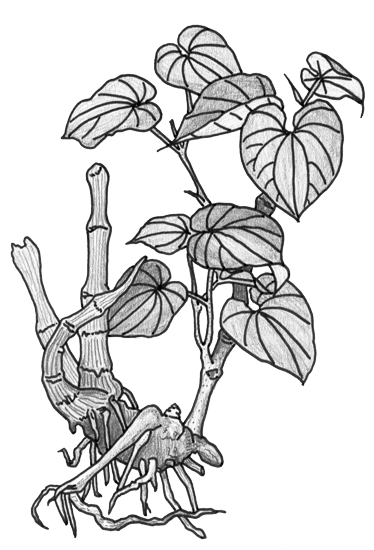
| nō-wōgtag ne gakava rootla racine de kava |
📙 Variétés non buvables de kava: Cf. yogam̄taqlap, yom̄taqgaga.
2 – slightly narcotic drink, traditionally drunk by important dignitaries (n-et liwo) in their secret house (na-gmel), and today by all men, in public or in private, at nightfall around 7 p.m.boisson légérement narcotique, traditionnellement consommée par les personnages importants (n-et liwo) dans leur maison secrète (na-gmel), et aujourd'hui par tous les hommes, en public ou en privé, à la tombée de la nuit vers 19 heures
| Nēk so in na-ga, nēk vatqep na-mte, den no-hohōw ne ga tale qal na-mte.When you drink kava, you must close your eyes, to protect them from the kava "vapour".Quand tu bois du kava, tu dois fermer les yeux, pour les préserver de la “vapeur” de kava. |
| Na-ga so ni-wuh nēk, tō ni-qti ni-m̄ōlm̄ōl aē, tō itōk.When the kava gets to you, your head starts swimming, and that's what's good.Quand le kava te prend, tu as la tête qui tourne, et c'est ça qui est bien. |
La consommation du kava ✧ Drinking kava ✧ in na-ga
Après que la première personne a inauguré (in lō) la boisson, elle sert (tigheg) les autres dans de petites coupes de coco (ni-vinlah). Quand chacun a bu sa ou ses coupes, il se rince la bouche (quq) avec de la nourriture (cf. gen goy) ou de la boisson (in goy) moins amère (gon). Il va s'asseoir, et attend de ressentir (yon̄teg hiy) les effets apaisants du kava. D'abord “frappé” (wuh) par la boisson, on ressent une somnolence enivrante (taleg, m̄ōlm̄ōl) ; puis peu à peu, l'effet s'estompe (m̄ōl hiy), et l'on peut enfin manger.
Once the first person has inaugurated (in lō) the kava session, he starts serving the others using small coconut cups (ni-vinlah). A man will typically drink between one and five cups in an evening. When you have drunk your cup, you refresh your mouth (quq) with food (see gen goy) or another drink (in goy) that’s less bitter (gon) than kava. You then go sit down, and stay still till you start feeling (yon̄teg hiy) kava’s soothing effects. You are first “struck” (wuh) by the drink, and later start feeling drowsy and tipsy (taleg, m̄ōlm̄ōl). Then slowly the feeling wears out (m̄ōl hiy), and you can finally go eat.
ga~3 na-ga~ naɣ̞a possessive classifier
1sgna-kis2sgna-gōm3sgna-gan
possessive classifier of edibles, designating x as food from yclassificateur possessif des comestibles, désignant un x comme nourriture de y
1 – presents x as to be eaten by y, literallyprésente x comme destiné à être mangé par y
| Na-gōm te mahgē ! Na-gan ige del.It's not only your food, it is everybody's food.Ce n'est pas (à manger) pour toi seul, c'est pour tout le monde. |
| na-gōm vetel / na-ptel na-gōmyour bananas (to eat)tes bananes (à manger). |
seegen ①
2 – + supernatural possessorfound in some periphrastic names of natural features+ possesseur surnaturelentre dans certaines périphrases décrivant certains éléments de la nature
| na-gvēg gan tamat unedible apple variety [lt. apples for Spirits]pommier non comestible [litt. pommes pour les Esprits] |
| na-m̄le gan Qet godly features of landscapevolcano lava [lit. broiled eggs for Ikpwet]éléments divins du paysagelave du volcan [litt. omelette pour Ikpwet] |
3 – figpresents x as to be affected by y, as a source of unpleasant or uncontrolled physical sensationsfigprésente x comme destiné à être subi par y, comme source de sensations physiques désagréables et non-maîtrisées
| Iyah, na-gōm !(volley-ball smash) Take that!(smash au volley-ball) Tiens, prends ça ! |
seeno-qo na-gōm
4 – Slga~ refers to love or sexual attraction. The woman, or a part of her body, is designated as a delicacy for the man; and vice versa.Argga~ est associé au rapport amoureux ou sexuel. La femme, ou une partie de son corps, est désignée comme une friandise pour l'homme ; et inversement
| Na-kis inēk.[you're my delicacy] I fancy you / I love you.[ma sucrerie c'est toi] J'ai envie de toi / Je t'aime. |
| Na-kis wongē.[your face is my sweet] You're cute![ma sucrerie c'est ton visage] Tu es mignon(ne)! |
| Na-gan mal aē si tateh qete ?Does she already have a boyfriend [“food”] or not yet ?Elle a déjà un copain [“à manger”] ou pas encore ? |
| Kē mo-yon̄teg na-gan manan aē.It really made her happy. / Slang She thrilled.Cela lui a fait énormément plaisir. / Arg. Elle a joui. |
g[a]ban na-gban naɣ̞ᵐban noun
<°kabáneMotagapanePNCV*kabanisail (n)
gag ɣ̞aɣ̞
gay
transitive verb
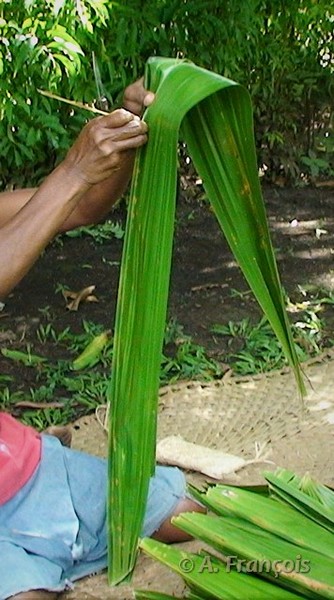
Redupgagag
Techniques
debone ‹a sago leaf, no-yot› by tearing off its midrib (h‹i›yi~▻④)désosser ‹une feuille de sagoutier, no-yot› en ôtant la nervure centrale (h‹i›yi~▻④)
📙 Permet d'assouplir la feuille avant de la plier lors de la confection des tuiles (Cf. vēn).
📘 This makes the leaf softer, so it can be flexed into a tile (see vēn).
gagah na-gagah naɣ̞aɣ̞ah noun
Motagasorafter
Redup. gah ‘assemble a structure’
1 – frame for certain structures (gah) made from semi-rigid materials, such as rattanarmature de certaines structures confectionnées (gah) à l'aide de matériaux semi-rigides, de type rotin
| na-gagah ne tētvēframe of a biscuit oven (round structure made of light wood)l'armature du four-à-biscuit (structure ronde, en bois léger) |
| na-gagah ne m̄otoframe of a food-safe (wicker)l'armature du garde-manger (en osier) |
gah1 ɣ̞ah transitive verb
Motagasoput on the rafters of a house
Redupgagah
1 – assemble ‹a structure› using semi-rigid materials such as rattan (na-gaqiy) or similar ( e.g. na-gawol); wickerworkassembler ‹une structure› à l'aide de matériaux semi-rigides, du type rotin (na-gaqiy) ou autres (ex. na-gawol); faire de la vannerie
| gah nō-m̄ōtocreate a pantryfabriquer un garde-manger |
synonymyēt
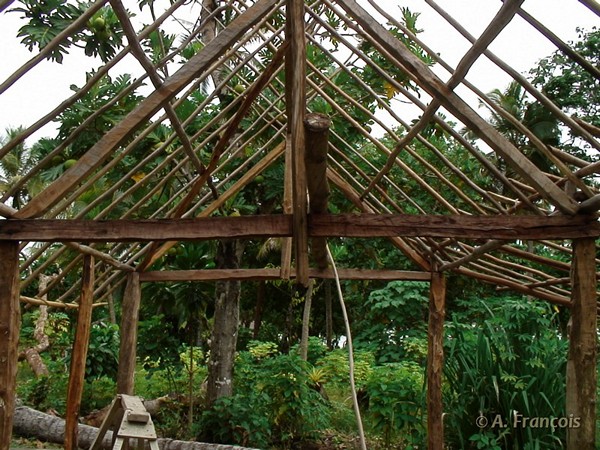
Architecture
2 – esperect the structure of ‹a house›, build its frame, its roof structurespécériger la structure de ‹la maison›, édifier son armature, sa charpente
| At tō gōh, veg nu-busmayaw ma-van me, gēn ōl so ‘wos’ n-ēm̄; ba ni-tiy kē en, so ‘gah’.Today, since the introduction of nails, one speaks of "nailing a house"; but the true term is gah "assemble (with lianas)".De nos jours, depuis l'arrivée des clous, on parle de “clouer une maison”; mais le terme authentique, c'est gah “assembler (avec des lianes)”. |
| Kem may gah kal n-ēm̄.That's it, we've finished setting up the structure of the house.Ça y est, on a fini d'ériger la structure de la maison. |
📙 Souvent gah kal ‘assembler-monter’.
gal1 ɣ̞al
PNCV*kaletease, joke, deceive
Aintransitive verb
Redupgalgal
1 – lie unintentionally, say s.th. wrong mistakenlymentir involontairement, se tromper dans ses propos
| Ēt! No ma-gal!Oh, no, I made a mistake!Hé non, je me suis trompé! |
synonymgayap
Btransitive verb
1 – lie to ‹s.o.›, purposely or not; mislead ‹s.o.›, give wrong information; make false promises to ‹s.o.›mentir à ‹qqn›, volontairement ou non; induire ‹qqn› en erreur, donner une information erronée; faire une fausse promesse à ‹qqn›
| No ta-gal vēste nēk.I wouldn't dream of lying to you / I'll keep my promise, I swear.Je ne me permettrais pas de te mentir / Je tiendrai ma promesse, sans faute. |
| Nok so vap van, ba no tele gal nēk.I'd really love to answer you, but I'm afraid I might mislead you [lit. lie to you].J'aimerais bien te répondre, mais je crains de t'induire en erreur [litt. de te mentir]. |
2 – lead ‹a child› to believe s.th to calm him down, console or amuse him, spec. under false pretenses; by ext. amuse or get ‹a child› to laughfaire croire qqch à ‹un enfant› pour le calmer, le consoler ou le distraire, spéc. en usant d'un stratagème mensonger; par ext. faire risette, amuser ‹un enfant›
Csuffix
suffixed to nouns or verbsfake, pseudo-: suffix found in certain technical compoundssuffixé à noms ou verbesfaux, pseudo-, semi-: suffixe entrant dans quelques composés techniques
| n-ēleg-galmusicfalse codamusiquela fausse coda |
| nē-qēthōn-gal architecturesecondary ridgepolearchitecturepseudo-faîtage |
| no-soso-gal architecturepseudo stringpiece (i.e. intermediate purlinarchitecturepseudo-sablière (i.e. panne intermédiaire) |
| voyot-galhalf saw, make a notchscier à moitié, encocher |
| tot-galhalf carve (hence sculpt, represent: cf. totgal)tailler à moitié (d'où sculpter, représenter: cf. totgal) |
Dnounna-gal
lie, inventionmensonge, invention
| Na-gal!It's a lie!C'est un mensonge! |
na-gal ne (N)
a mimicry of Na true N, it looks like an N: exclamation highlighting a resemblanceun simulacre de Nun vrai N, on dirait (comme) un N: exclamation soulignant une ressemblance
| Na-gal ne vōy!It really looks like a volcano!On dirait vraiment un volcan! |
| Na-gal ne Rambo!A true Rambo!Un vrai Rambo! |
Einterjectionna-gal
lie!of course, duh! Exclamation pointing out s.th. obviousmensonge!bien sûr, évidemment! Exclamation soulignant une évidence
| Ino, na-gal!It's me, of course! [lit. It's me, liar!]C'est moi, évidemment! [litt. C'est moi, menteur!] |
IdiomIl faut comprendre: ‘Tu ne peux pas être sincère (gal) en me posant cette question, car tu es censé en connaître la réponse’.
PhrasThe underlying meaning is: ‘You must be kidding me (gal) in asking that question, you're supposed to know the answer’.
gal2 ɣ̞al transitive verb
1 – arouse ‹a force: fire, magic spell› through a careful ritualsusciter ‹une force: feu, pouvoir magique› à travers un rituel minutieux
gal n-ep phrasal verb
light ‹a fire, n-ep› using tinder (cf. nu-nuy) – typic. by blowing gently on the spark, or holding the tinder and swaying hands to help the wind light the firefaire prendre ‹un feu, n-ep› à partir d'amadou (cf. nu-nuy) – typiq. en soufflant sur l'étincelle, ou en tenant l'amadou dans les mains qu'on agite pour attiser la flamme naissante
| Kēy gal n-ep a le-qyēn̄i qōqō, tō n-ep ni-lawlaw; tō yōqō hag na-lēt.You light the fire down in the stone oven, till the fire goes; only then do you add the firewood.On allume le feu au fond du four à pierres, jusqu'à ce que le feu prenne; puis on ajoute ensuite le bois. |
seeseswo-ep
gal na-man phrasal verb
Magic
witchrouse ‹a magic power, na-man› by blowing onto magic leaves in o.'s hands; hence perform witchcraftsorciermettre en œuvre ‹un pouvoir magique, na-man›, typiq. en soufflant sur des feuilles dans ses mains; d'où se livrer à la sorcellerie
| N-et tēytēy tēnge en ni-gal na-man nonon e tō ni-leh ne-len̄.The sorcerer employs his magic power, and diverts the wind.Le sorcier joue de son pouvoir magique, et détourne le vent. |
| Am̄ag en a, kēy wo gal na-man, kē ni-aktig tasga geh.In olden days, performing witchcraft was always successful.Autrefois, lorsqu'on se livrait à la sorcellerie, le vœu était toujours exaucé. (cela fonctionnait toujours) |
L’art du sortilège ✧ Casting spells ✧ gal na-man
N-et ba-man kē ta-gal vēh ne-len̄, ne-len̄wuh, na-naw, na-sm̄al, n-ep… Ta-gal vēh na-sm̄al so ni-sm̄al siso kē ni-mamah; ta-gal vēh na-naw so kē ni-tay, siso kē ni-nawnaw; ta-gal vēh n-ep so kē ni-lawlaw, siso kē ni-matmat.
“Un magicien peut ensorceler le vent, la tempête, la pluie, l'océan, le feu… Il peut faire en sorte que la pluie tombe, ou qu'elle s'arrête; faire en sorte que la mer se calme, ou au contraire s'agite; il peut faire qu'un incendie naisse, ou s'éteigne.”
“A wizard can cast a spell on the wind, a hurricane, ocean, rain, fire… He can make the rain fall, or make the rain stop. He can calm down the seas, or make them rough. He can arouse a fire, or put it down.”
2 – witchact upon ‹the elements› using magic powerssorcieragir sur ‹les éléments› par magie; ensorceler
| Tateh mino man, no ta-gal vēste ne-len̄.I have no magic powers, I can't put a spell on the rain.Je n'ai pas de pouvoir magiques, je ne peux pas ensorceler la pluie. |
synonymman ① ⓑ▻①
3 – rarewitchact upon ‹s.o.› using magic powers; cast a spell on ‹s.o.›, bewitchraresorcieragir sur ‹qqn› par magie; lancer un sortilège
| No ta-gal vēh na-lqōvēn nan so kē ni-myōs nēk, so kē ni-ukēg ēgnōn…I can cast a spell upon that woman so she falls in love with you, and leaves her husband…Je peux ensorceler cette femme pour qu'elle tombe amoureuse de toi et abandonne son mari… |
gal hethet transitive verb
Magic
resultative compoundbewitch unfortunatejinx, curse ‹s.o., s.th.›, deploy black magic against s.o.composé résultatifensorceler malheureuxlancer une malédiction, jeter un sortilège à ‹qqch, qqn›
synonymti hethet
g[a]la ɣ̞ala
Anounna-gla
left side of the human body, esp. left handcôté gauche du corps humain, spéc. main gauche
antonymmōtō
galeg ɣ̞alɛɣ̞ transitive verb
Redupgagaleg
casual synonymak
1 – make, produce ‹s.th.›registre formelconcretfabriquer, réaliser ‹qqch›
| ige mey a kēy ma-galeg n-ēm̄ enthose who built the houseceux qui ont construit la maison |
| ige galeg-ēm̄the builders (of houses)les constructeurs (de maison) |
| galeg na-tamn̄amake a matréaliser une natte |
| galeg n-epmake a firefaire un feu |
2 – abstrmake, prepare, createabstrfaire, préparer, susciter
| galeg na-gaprepare [make] kavapréparer [faire] le kava |
| galeg na-pyēyagsweep [do] the rubbishbalayer [faire] les détritus |
| galeg ne-gengenprepare the meal, cookpréparer le repas, cuisiner |
| Kem galeg na-wha.We'll play [make] music.On va jouer [faire] de la musique. |
| Kēy ma-galeg na-hap mey a ne-het.What they did is not good.Ce n'est pas bien, ce qu'ils ont fait. |
3 – espplantpresent a particular development stagespécplanteprésenter tel ou tel stade de croissance
| Kē mal galeg na-yon.It's already got [made] its leaves.Il a déjà [fait] son feuillage. |
| Ni-hnag et-galeg galsi te n-ēwan.The yam hasn't grown properly [didn't make its fruit].L'igname ne s'est pas bien développé [n'a pas bien fait son fruit]. |
4 – do as if; act in such a way that, make sure that+ (a) so + Prop.faire comme si; faire en sorte que, veiller à ce que
| Nēk galeg a so nēk may dēm veteg na-haphap a kē ma-galeg tō van hiy nēk.You act as if you'd forgiven him for what he'd done to you.Tu fais comme si tu lui avais pardonné ce qu'il t'a fait. |
| Dōyō mas galeg a so kē mas togolgol.We must make sure that (the song) is perfect.Nous devons veiller à ce que (la chanson) soit parfaite. |
| Na-Tmat so ni-galeg so Iqet so tateh.Satan wanted to make sure that God disappeared.Satan voulait faire (en sorte) que Dieu disparaisse. |
galeg galsi ɣ̞alɛɣ̞alsi transitive verb
make properlyrepair, patch up ‹s.th.›réaliser correctementréparer, rafistoler ‹qqch›
| No-tos mino me-het, nēk ta-galeg galsi vēh?My lamp doesn't work, can you fix it?Ma lampe ne marche plus, tu peux la réparer? |
seewiyis
galēs ɣ̞alɪs
galgalgoy ɣ̞alɣ̞alɣ̞ɔj transitive verb
2 – derogdo s.th. haphazardly, in a botched manner; suck at s.th.péjne pas savoir s'y prendre, faire qqch n'importe comment; être nul
| Kēy galgalgoy ēwē.dancersThey're just faking it! (i.e. they suck at it)danseursIls s'y prennent très mal ! |
seesoloteg
galgal m̄aya ɣ̞alɣ̞al ŋ͡mʷaja intransitive verb
act, play a part to amuse the public; by ext. give a comical or serious theatrical performance – e.g. in churchmentir drôlejouer la comédie, faire du théâtre pour faire rire le public; par ext. donner une représentation théâtrale, comique ou non – ex. à l'église
| na-hye galgal m̄ayatheatre [place to perform comedy]modsalle de théâtre [lieu pour jouer-la-comédie] |
galsi ɣ̞alsi postverb
Redupgalgalsi
freqwell, correctly, exactlycourbien, correctement, tout à fait
| Nēk te-mtiy galsi qiyig.You'll see, you'll sleep very well tonight.Tu verras, tu vas très bien dormir ce soir. |
| Kōyō m-etgoy galsi ēntēyō.Both took good care of their child.Tous deux ont pris grand soin de leur enfant. |
| Nok et-ēglal galgalsi te.I'm not perfectly sure about that.Je ne m'y connais pas parfaitement. |
| Nēk hohole galsi den no.You speak even better than I do.Tu parles encore mieux que moi. |
gam ɣ̞am intransitive verb
Motagam̄osail, make a sailing voyage
Redupgamgam
ship, sailorssail on the oceanbateau, marinsnaviguer à la voile, faire voile sur l'océan
| n-ok gamgamsailboat [canoe with sail]voilier [pirogue qui fait voile] |
| Ni-siok vitwag gamgam tō agōh !A sail on the horizon! [lit. a canoe is sailing here]Une voile à l'horizon! [litt. une pirogue fait voile ici] |
📙 L'usage des pirogues à voile est aujourd'hui quasiment perdu.
📘 The use of sailing ships has now been almost abandoned.
gamat na-gamat naɣ̞amat noun
(?) ga- ④ ‘vine, creeper’
gamteg ɣ̞amtɛɣ̞ transitive verb
walk ‹s.o.› somewhere; lead, be a guide to ‹s.o.›mener, amener ‹qqn› qqpart (à pied); servir de guide à ‹qqn›, accompagner
| Nēk so gamteg kē me.Bring her to me.Conduis-la jusqu'à moi. |
synonymtēy
g[a]nah na-gnah naɣ̞nah noun
MotaganasePNCV, POc*kanase
📙 Le mulet est pêché en énormes quantités à l'occasion de fêtes, lesquelles impliquent des repas collectifs. Pour cela, une demi-douzaine d'hommes part quelques jours pour l'île voisine d'Ayô, et rapportent des centaines de ces poissons
📘 This fish is caught in large quantities at feast times which imply collective meals. About six men go off for a few days to the local Ayô island to catch hundreds of these na-gnah.
seeAyō
ganwon ɣ̞anwɔn postverb
Motaganawonowantonly, carelessly
gap1 ɣ̞ap intransitive verb
PTB°ɣaβafly with flapping wingsPOc*kabaflap wings; wing
Redupgapgap
| Ne-bem so ma-gapgap lelo ēm̄ en, vasem so hiqiyig ta-van qiyig me.If a butterfly flies into the house, it's a sign someone is going to visit you.Si un papillon vole dans la maison, c'est le signe que quelqu'un va nous rendre visite. |
gap2 ɣ̞ap transitive verb
Lemeriggav
Redupgapgap
| Nēk so tēq ne-men en, nēk gap n-ih, nēk tin ne-men, tō nēk ukēg veteg na-qtag ni-hal ni-bōl sisgoy kē.When you want to hit a bird, you draw your bow, you aim at the bird, then you release your arrow so it flies and knocks it down.Si tu veux assommer un oiseau, tu bandes ton arc, tu vises l'oiseau, puis tu décoches pour que ta flèche vole et aille l'assommer. |
| Gayētyēt kē gap tō n-ih, qēs m̄ēt veteg hag li-qti qon en, ni-sisgoy.Cordyline stretched his bow, shot and split the pigeon's head.Cordyline bande son arc, lance un trait qui vient se fracasser sur la tête de la palombe. |
synonymtuwuh
gap3 na-gap naɣ̞ap noun
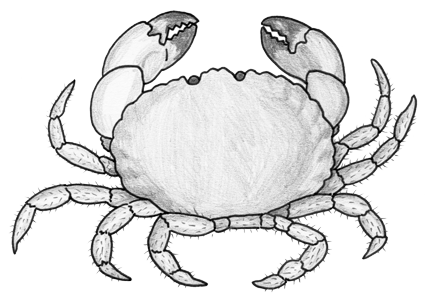
POc*kapecrab taxon, probably a rock crab (Grapsidae)\nt
Fauna
nom génériquegenericcrabcrabe
| nē-lwo gapcrab's claw ['tooth']pince [‘dent’] de crabe |
| Na-gap ma-sak lō den na-qyan̄ nonon.The crab crawled out of his hole.Le crabe a émergé de son trou. |
seeg[ō]yōw
gapluwyeg ɣ̞apluwjɛɣ̞ transitive verb
Cf. luwyeg ‘pour, spill’
spill ‹liquid› accidentally, clumsilyrenverser ‹liquide› par mégarde, en faisant un faux geste
| Yugo ma-gapluwyeg ni-gli wōm̄ēl naman.Yugo spilled his orange juice.Yugo a renversé son jus d'orange. |
gapwut ɣ̞apwut transitive verb
heave up ‹soil›soulever ‹le sol›, en faisant un petit monticule
| Gēn wōq nē-tqē mi nē-qētah kē ni-yoy, tō gapwut.plantage des ignamesOn laboure le champ en y enfonçant un bâton-à-fouir, puis (en faisant levier) on soulève la terre. |
| Ni-hnag ta-gapwut vēh nē-vētan.L'igname est capable de soulever la terre (en poussant par en-dessous). |
gapyuy na-gapyuy naɣ̞apjuj noun

<°ɣa-βaruru
ga- ④ ‘vine, creeper’
Flora
a giant liana (unidentified), extremely thick and robustliane géante (non identifiée), particulièrement épaisse et robuste
| Na-glon en, ne-mtēltēl qele na-gapyuy a hag lē-m̄ēt en.Giant PigIts tail was as huge as the giant liana from the bush. |
gaqlep na-gaqlep naɣ̞ak͡pʷlɛp noun
Cf. Ragagabwalevasorcery, black magic
ga- ④ ‘vine, creeper’
Magic
magic plant, used for the power of its leavesplante magique, utilisée pour les pouvoirs de ses feuilles
gasel na-gasel naɣ̞asɛl noun
1 – genknifegéncouteau
gatay ɣ̞ataj
<°ɣato-taraMotagatotalktaramention a person's name
Atransitive verb
Redupgagatay
1 – evoke, speak about ‹s.th.›; mention, quote ‹(the name of) s.o.›évoquer, parler de ‹qqch›; mentionner, citer ‹(le nom de) qqn›
| Kem mō-yōstiwag en, kemem ma-gatay se na-he.During our meeting, we also mentioned your name.Au cours de notre réunion, nous avons également cité ton nom. |
| Na-he taq tō gōh kē, kēy et-gatay te van namwumwu namu.In this ode in your honour, they forgot to speak about your work.Dans cette ode en ton honneur, ils ont oublié d'évoquer ton travail. |
Bpostverb, transitive
after speech Vabout, on the subject of ‹s.o., s.th›; (speak) ofaprès V de paroleà propos de, au sujet de ‹qqn, qqch›; (parler) de
| Nok hole gatay na-laklak to-M̄otlap.I'm going to speak about [lit. speak-mention the] Motalava dances.Je vais parler des [litt. parler-mentionner les] danses de Motalava. |
| Dō ma-kaka gatay tō en, et-misin goy qete en!But we've just spoken about that!Mais on vient tout juste d'en parler! |
gatgat ɣ̞atɣ̞at
Motagatospeak; talk another language
Atransitive verb
formal registertalk, speak; esp. speak ‹a foreign language›registre formelparler ; spéc. parler ‹une langue étrangère›
| Ige qoywon, kēy gatgat nono-y mi na-mne-y.The deaf speak with their hands.Les sourds ont la particularité de parler avec les mains. |
casual synonymhohole
Bnounna-gatgat
formal registerlanguage, dialectregistre formellangue, dialecte
| na-gatgat to-M̄otlapthe language of Mwotlap, Mwotlapla langue de Mwotlap, le mwotlap |
| Kē et-ēglal te na-gatgat nongēn.She doesn't know our language.Elle ne connaît pas notre langue. |
| ige tēytēybē ne gatgat[language doctors] linguists[les médecins des langues] les linguistes |
gatqēh na-gatqēh naɣ̞atk͡pʷɪh noun
Flora
k.o. tree, unidentified
📘 Its sticky gum is sometimes used as glue.
gavey na-gavey naɣ̞aβɛj noun
ga- ④ ‘vine, creeper’
Flora
climbing plant linked to the beach hibiscusplante grimpante liée au bourao
seene-vey
gawol na-gawol naɣ̞awɔl noun
ga- ④ ‘vine, creeper’
| Nok nin na-gawol, tō yēt maymay nē-qētēnge aē.I peel my rattan cane, then I can use it to attach the beams.Je décortique mon rotin, puis je l'utilise pour attacher les poutres. |
ga-wow na-gawow naɣ̞awɔw noun
ga- ④ ‘vine, creeper’
Flora
(unidentified) plantplante (non identifiée)
gay1 ɣ̞aj transitive verb
Techniques
debone ‹a sago leaf, no-yot› by tearing off its midrib (h‹i›yi~▻④)désosser ‹une feuille de sagoutier, no-yot› en ôtant la nervure centrale (h‹i›yi~▻④)
📙 Permet d'assouplir la feuille avant de la plier lors de la confection des tuiles (Cf. vēn).
📘 This makes the leaf softer, so it can be flexed into a tile (see vēn).
gay-2 ɣ̞aj- prefix
half, partly: prefix with low productivitysemi-, à moitié: préfixe faiblement productif
gay-3 ɣ̞aj- prefix
Motagaragarato clench the teethPOc*kaRatbite
clench the teeth: a non-productive element in compoundsserrer les dents: élément non-productif présent dans quelques composés
| gayēy grind o.'s teethgrincer des dents |
| gaymōm mumblemarmonner |
g[a]yaq ɣ̞ajak͡pʷ adjective
MotagaraqaPNCV*karabʷa
newneuf
| Na-mlaklak b-ēte gayaq!Happy new year![Joie pour l'an neuf] Bonne année ! |
gayētyēt na-gayētyēt naɣ̞ajɪtjɪt noun
ga- ④ ‘vine, creeper’ + yēt ‘tie, bind’
gayga na-gayga naɣ̞ajɣ̞a noun
<°ˌɣaro-ˈɣaeNorth-V°ɣa[w]eliana, vine, ropePNCV*kaʀovine, rope
Flora
1 – any kind of natural liana or climbing plantnom générique des lianes et plantes grimpantes
| Kem tot na-gayga, yoweg hoyo hiy nē-vēthiyle.You cut a liana and lay it down on the beach.On coupe une liane, et on l'étend dans toute sa longueur sur la plage. |
seega-
na-gayga non Ham noun
Flora
Ham's lianaclimbing planta weed, bsl. Amerikan ropliane de Hamplante grimpante (Composée), bsl. Amerikan ropMikania micrantha.📙 Connue après l'arrivée des Américains à Santo pendant la Deuxième Guerre Mondiale (cf. nom bislama), cette plante fut introduite à Mwotlap par un dénommé Ham, d'où son nom.
📘 This plant was brought into Mwotlap after W.W.II, by a man called Ham.
Techniques
2 – liana having a function ( e.g. to tie, link up, hook, delimit, etc.); rope, string, thread, wire, cable, electric wireliane en tant qu'elle est investie d'une fonction (ex. pour attacher, relier, accrocher, délimiter, etc.); par anal. corde, cordon, ficelle, fil, câble, fil électrique
| na-gayga mōmōstring of fishcordon de poissons |
| Ige lōqōvēn kēy ye yosveg nō-mōmō, kēy tabay la-gayga nonoy.The women caught many fish and hooked them one by one on to their ropes.Les femmes attrapaient force poissons, et les enfilaient un à un sur leurs cordons. |
| Kēy wōkwōk na-qyan̄, kēy yoweg na-gayga, kēy wōkwōk na-qyan̄…yam cultivationThey dug out a hole, stretched out a line, dug another hole...culture de l'ignameIls creusent un trou, tendent un cordeau, creusent un autre trou… |
| Kē ni-lēg na-gayga van lē-qēthōn, tō ni-lēg mat kē aē.As soon as he'd fixed the rope to the main beam, he hung himself and passed away.Après avoir fixé la corde à la poutre faîtière, il se pendit, et rendit l'âme. |
| Kēy lep na-gayga tō kēy susuy ne-qen aē.With a string we make a net.Avec une ficelle, on confectionne un filet. |
| na-gayga yapyapfishing line, linefil de pêche, ligne |
seega-
gaygay3 na-gaygay naɣ̞ajɣ̞aj noun
gaygay ① ‘itchy’ (?)
Fish
reef fish: blue stiped Eleotrispoisson récifal: Eleotris à raie bleueValenciennea strigata (?).
gaygaymamah ɣ̞ajɣ̞ajmamah intransitive verb
fast: purposefully refrain from consuming food for a certain period, for ritual or religious motivationsjeûner : se passer volontairement de certaines nourritures pendant une certaine période, pour des raisons rituelles ou religieuses
| Nok gaygaymamah bō-qōn̄ liviyō.I've been fasting for a whole week.Je jeûne depuis une semaine. |
gayme~ na-gayme naɣ̞ajmɛ noun, relational
Motagaram̄ea-iPOc*kaRamayatongue
Anatomy
1 – hum, animaltonguehum, animallangue
| na-gayme m̄atvicious tonguelangue de serpent |
| Nē-bē sewsew me-sqo na-gaymek.I burnt my tongue with the tea.Je me suis brûlé la langue avec le thé. |
| Kōyō vēy-wesewseg na-gaymayō.They kiss each other on the lips [lit. stick each other's tongue out]Ils s'embrassent sur la bouche [litt. se tirent la langue l'un l'autre]. |
gaymōm ɣ̞ajmʊm postverb
Cf. gay- ③ ‘clench the teeth’
mumble, (speak) indistinctly, unintelligibly+ V de parole(parler) en marmonnant, sans articuler, de façon incompréhensible
| Ige susu, kēy hohole gaymōm.Children babble. [speak-mumble]Les enfants, ça babille. [parler-marmonner] |
| Nok sese-eh gaymōm ēwē, veg nok et-ēglal te na-vavap nan.I sometimes sing to myself / without articulating [sing-mumble], because I don't know the words.Je chante un peu dans ma barbe / sans articuler [chanter-marmonner], car je ne connais pas les paroles. |
gayte na-gayte naɣ̞ajtɛ noun, relational
Motagarataifragment, remnant
piece, portion ‹of s.th.›morceau ‹de qqch›
Cf. gay-_1
| na-gayte gengena piece of foodun morceau de nourriture |
seena-tkel-gimorceaupiece, morsel
gaytegi ɣ̞ajtɛɣ̞i
Aintransitive verb
rarebe halfway throughrareen être à la moitié
| Nō-bōk mino mal gaytegi.My notebook is halfway through.Mon cahier en est à sa moitié. |
Bnounna-gaytegi
Time
2 – when telling the timehalf an houren indiquant l'heuredemi-heure
| Na-lo vētēl na-gaytegi.It's half past three.Il est trois heures et demie. |
| Lelo vētēl si so na-gaytegi vētēl.At three o'clock, or three thirty.À trois heures, ou trois heures et demie. |
| tege le-lo na-gaytegi vōyōat around 2:30pmà 14h30 environ |
📙 Précède ou suit le chiffre des heures.
📘 Comes before or after the word for hours.
-ge3 ɣ̞ɛ suffix
°ɣaithing
Cf. ge ①
1 – numeral classifier of humans, used as an element in three collective determinerclassificateur numéral des humains, entrant dans la formation de trois déterminants collectifs
| yo-ge(the) two (people)(les) deux (personnes) |
| tēl-ge(the) three (people)(les) trois (personnes) |
| i-ge(the) people; Plural article for humansles gens, les N |
geay ne-geay nɛɣ̞ɛaj noun
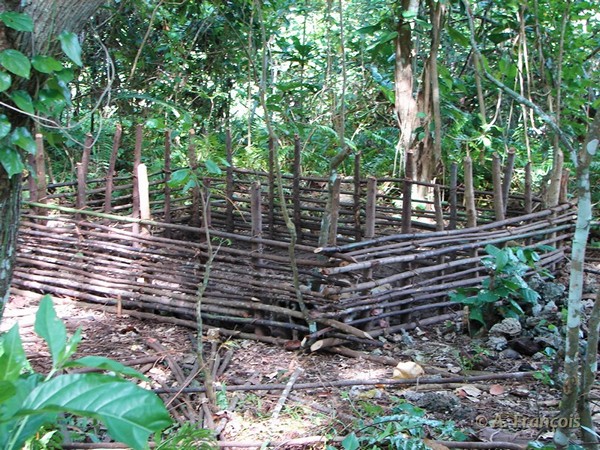
1 – fenceenclos
| Nē-tqē mino, tateh geay.My garden has no fence.Mon jardin n'a pas de barrière. |
derivativegeay goy
geay goy ɣ̞ɛajɣ̞ɔj transitive verb
fence in, surround ‹s.th.› with a fence,enclore
| Imam me-geay goy nē-tqē.Dad erected a fence around the garden.Papa a monté une palissade autour du jardin. |
derivativegeay goy
geh ɣ̞ɛh determiner
1 – each one of them, everyone, all of them. Distributive, consisting of distributing the same predicate on a parallel, on several referents taken separatelychacun, les uns comme les autres, tous autant qu'ils sont. Marque du Distributif, consistant à distribuer un même prédicat en parallèle, sur plusieurs référents pris séparément
| Ige to-M̄otlap geh anen.All those people are from Mwotlap (each and every one of them).Tous ces gens-là sont de Mwotlap (tous autant qu'ils sont). |
| Ige geh nen, qulqul nonoy geh aē.Those (girls) over there, with no exception, they've all got boyfriends.Les (filles) que tu vois là, toutes autant qu'elles sont, elles ont déjà toutes un petit ami. |
| Kēy gapgap geh me ēgēn!winged spiritsThey all came flying, one after the other.démons ailésIls arrivèrent en volant, les uns après les autres. |
| Iqet mi-tin̄tin̄ n-et geh.Iqet created men, one after the other.Iqet créa les hommes, les uns après les autres. |
| Kēy goy vētgi me, ne-ptig geh na-kaskas lē-qtēy.Here they come in crowds, everyone with a flower in their hair.Les voici qui arrivent en foule, avec chacun une fleur dans les cheveux. |
| No-yobem gōh e, na-hek na-taq geh aē.In this book my name appears several times.Dans ce livre, mon nom apparaît plusieurs fois. |
| Kem et-ēglal te na-kaka geh gōh en.We don't know all those stories.Nous on ne connaît pas toutes ces histoires-là. |
| Iyē geh nen?Who is it? Who are these people? (what are their names, of each of them?) – Cf. iyē.Qui est-ce? Qui sont ces personnes? (quels sont leurs noms aux uns et aux autres?) – Cf. iyē. |
📙 Du fait de sa valeur de Distributif, geh souvent implique une lecture plurielle.
📘 Due to its Distributive meaning, geh typically implies a plural reading.
2 – with negationnone, not at all+ négationaucun, pas du tout
| Tateh ipluk geh.I have no friend.Je n'ai aucun ami. |
| Tateh et geh le-pnō, ige del mē-qēt bi-hilhil !There's absolutely no one in the village, they've all gone to the fields.Il n'y a absolument personne au village, ils sont tous partis aux champs. |
| Tateh gengen geh so kēy so gen.They had nothing [at all] to eat.Ils n'avaient rien [du tout] à manger. |
| No et-ēglal geh te.I don't know anything at all about that.Je n'en sais rien du tout. |
g[e]mel na-gmel naɣ̞mɛl noun
Motagamalclub-house of POc*kamali(R)men’s meeting house
men's house, bsl. nakamal. Designates several kinds of common houses reserved for men, and associated with exercising powermaison des hommes, bsl. nakamal. Désigne plusieurs sortes de maisons communes réservées aux hommes, et associées à l'exercice du pouvoir
History
1 – ancpalace, private home of dignitaries (welan), in former society. Noble term to designate 'house' (n-ēm̄) in stories and myths.archpalais, maison privée des dignitaires (welan), dans la société ancienne. Parf. terme noble pour désigner la ‘maison’ (n-ēm̄), dans les contes et mythes
| Iqet mitiy tō a le-gmel nonon.mythIkpwet was sleeping in his house.mytheIkpwet était en train de dormir dans sa demeure. |
La demeure des dignitaires ✧ The dwelling of dignitaries ✧ na-gmel
History
2 – sacred house in which some ceremonies took place to establish dignitaries of high rank (cf. nō-sōq), in former societymaison sacrée, dans laquelle se déroulait une partie des cérémonies d'intronisation des dignitaires de haut rang (cf. nō-sōq), dans la société ancienne
La maison sacrée des initiés ✧ The sacred house of initiates ✧ na-gmel
Cette maison sacrée, réservée aux initiés, était pourvue de onze fours à pierres (na-qyēn̄i), correspondant aux onze rangs du nō-sōq. Pour obtenir un rang, le candidat (na-mtesē) devait être capable de payer (wēl) et de manger entièrement (gen vaywēg) le contenu d'un four.
Modernity
3 – freqhouse reserved for village chiefs (mayanag), sometimes for adult men in general. part. designates the local council house (also called n-ēm̄ qos)courmaison destinée aux chefs (mayanag) de village, voire plus largement aux hommes adultes. Partic. désigne la maison du conseil municipal (également appelée n-ēm̄ qos)
4 – hencehouse reserved for drinking kava, including in its modern and urban form of kava-bar, where kava is bought by the glasspar extmaison destinée à la consommation du kava, y compris sous la forme moderne et urbaine du kava-bar, où l'on paye le kava au verre
📙 Bien que la formule soit originaire de la ville, le premier kava-bar s'est ouvert à Mwotlap en 1998.
gen1 ɣ̞ɛn
POc*kanieat
Atransitive verb
Redupgengen
poss. classifierga~ ③
1 – eat ‹meat, vegetables +›manger ‹viande, légume+›
| Gen !Eat it!Mange-le ! |
| Kem me-gen nō-mōmō, kem me-gen ne-beg…We ate fish, we ate breadfruit...Nous avons mangé du poisson, nous avons mangé du fruit-à-pain… |
📙 Pour l'anthropophagie, on utilise kuy ‘croquer’.
📘 Man-eating involves a different verb, kuy ‘crunch’.
2 – figsuffer ‹s.th. unpleasant›; be forced to receive or do s.th., in the form of a testfigsubir ‹qqch de pénible›; être obligé de recevoir ou de faire qqch, sous forme d'une épreuve à passer
| No mal tēytēy bah nō-wōlin̄lin̄yeg, tō nēk gen ēgēn !marble game in the sandThere you go, I've hidden the tokens, it's your turn to eat them now! [i.e. rummage through the sand with your hand]jeu des cailloux dans le sableÇa y est, j'ai caché les jetons, à toi de les manger maintenant ! [i.e. fouiller le sable avec la main] |
seega~ ③▻③
Anthropology
3 – eat ‹an oven, na-qyēn̄i+›move up the ranks in the initiatory hierarchy. In the course of a secret ceremony, the candidate had to eat ‹the contents of an oven›, among the dozen stone ovens (na-qyēni) corresponding to the dozen ranks of the initiatory course (nō-sōq); hence acquire ‹such and such rank›manger ‹un four, na-qyēn̄i+›gravir un échelon dans la hiérarchie des rangs initiatiques. Au cours d'une cérémonie secrète, l'impétrant devait manger ‹le contenu d'un four›, parmi les douze fours-à-pierres (na-qyēn̄i) correspondant aux douze rangs du cursus initiatique (nō-sōq); d'où acquérir ‹tel rang›
| Kē me-gen nē-tētuw ; kē me-gen na-lan.He passed [lit. ate] the grade netetuw, he passed the grade nalan.Il a gravi [litt. mangé] le rang netetuw, il a gravi le rang nalan. |
SyntaxeL'objet de gen est soit le nom na-qyēn̄i ‘four à pierres’, soit l'un des douze rangs initiatiques.
SyntaxThe object of gen is either the noun na-qyēn̄i ‘stone oven’, or the name of one of the initiatory grades.
derivativegen heylōaccomplir toutes les épreuves de l'initiationcomplete all the grades of initiation
gengen ɣ̞ɛnɣ̞ɛn
PNCV*kanikanioccasion of eating (feast, meal); food
Redup. gen ①
Aintransitive verb
take one's meal, eatprendre son repas, manger
| Sōwō, gengen![come on, let's eat] Meal's ready![allez, on mange] À table! |
| Nok gengen, ba na-maygay ni-akak no.I'm still hungry, even after a meal.J'ai beau manger, j'ai encore faim. |
| gengen tot-matapeat in the morning, have breakfastmanger le matin, petit-déjeûner |
| gengen lēwomyeneat at midday, lunchmanger le midi, déjeûner |
| gengen yēpyepeat in the evening, dinemanger le soir, dîner |
| gengen mamah[eat dry] fast[manger sec] jeûner |
| gengen tuvusm̄el[eat big chief] eat with one's fingers, from the plate [manger grand-chef] manger avec les doigts, à même le plat |
Btransitive verb
eat ‹s.t.› habituallymanger ‹qqch› habituellement, être mangeur de
| No ne-gengen ēwē nō-mōmō.I only eat fish.Je ne mange que du poisson. |
Cnounne-gengen
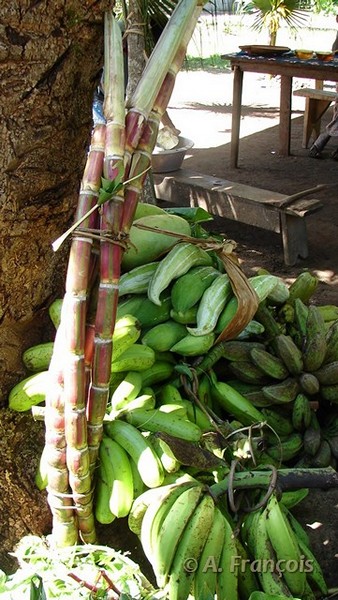
1 – foodnourriture, aliments
| Ne-gengen nagangēn ma-bah qēt.We've got nothing left to eat.Nous n'avons plus rien à manger. |
2 – predicatesomething edible, that can be eatenen prédicatchose comestible, qui se mange
| Na-ptel gōh et-gengen te.This (type of) banana is not edible [lit. is not food].Ce (genre de) banane ne se mange pas [litt. n'est pas un aliment]. |
3 – meal, esp. collective mealrepas, spéc. repas collectif
ne-gengen liwo noun

great mealgathering around a collective meal; feast, party, celebrationgrand repasfête, festin: rassemblement autour d'un repas collectif
| Kēy so galeg ne-gengen liwo.They're going to make a big collective meal.Ils vont faire un grand repas collectif. |
synonymnō-qōn̄ liwo
loanna-lavēt
gengen totmatap ɣ̞ɛnɣ̞ɛn tɔtmatap
akvayge totmatap
Aintransitive verb
eat chop-morninghave breakfastmanger coupe-matinprendre le petit-déjeuner
| Akvayge totmatap bah, kēy van muwumwu nonoy.They took their breakfast, and left for work.Ils prirent leur petit-déjeuner, puis partirent au travail. |
| No me-mtiy taq, ba no et-buste gengen totmatap en.I slept in, I don't need breakfast.Je me suis réveillé tard, je n'ai pas envie de petit déjeuner. |
gen heylō ɣ̞ɛnhɛjlʊ
gen vaywēg
transitive verb
Anthropology
eat through ‹the men's house›go through all the grades of the initiatory course (nō-sōq) represented in the ‹initiatory house na-gmel›; hence move up all the steps of the grade hierarchy, reach the highest rankmanger de bout en bout ‹la maison des hommes›franchir l'ensemble des échelons du cursus initiatique (nō-sōq) représentés dans ‹la maison initiatique na-gmel›; d'où compléter entièrement le cursus des grades, atteindre au rang suprême
gen nō-qōn̄ ɣ̞ɛn nʊk͡pʷʊŋ phrasal verb
gen ① + qōn̄A6
Anthropology
eat s.o.'s daystake a meal to celebrate ‹a certain number of days, nō-qōn̄› since someone died; hence accomplish a family ceremony to commemorate the deceasedmanger ‹les jours de qqn›prendre un repas pour célébrer ‹un certain nombre de jours, nō-qōn̄› depuis le décès de qqn; d'où accomplir une cérémonie familiale en l'honneur d'un mort
| Kem gengen nō-qōn̄ son̄wul nonon ēgēn.Today we commemorate [lit. eat] the tenth day (of his death).Aujourd'hui, nous célébrons [litt. mangeons] le dixième jour (de son décès). |
EthnologieLa cérémonie principale a généralement lieu 10 jours après le décès.
EthnThe main such ceremony generally takes place exactly 10 days after the passing.
g[e]sew na-gsew naɣ̞sɛw noun
Flora
a wild variety of bush-nut (ne-vel, na-wtag)arbre, variété sauvage de navel (ne-vel, na-wtag)Barringtonia racemosa.
gey ɣ̞ɛj
PNCV*karuswim, bathePOc*kaRu
Aintransitive verb
Redupgeygey
1 – to wade through water; to ford a river – espec. between the Lahlap beach and the Aya isletévoluer dans l'eau, en touchant le fond ou non; marcher dans l'eau, passer à gué – partic. entre la plage de Lahlap et l'îlot d'Aya
2 – espswim, move through water without touching the bottomspécnager, évoluer dans l'eau sans toucher le fond
| No me-gey ēwē.I'm out of my depth [lit. I'm swimming only].Je n'ai plus pied [litt. je nage seulement]. |
| Nē-nētm̄ey ni-geygey misimsin, na-bago ni-n̄it kē.The child swam too slowly, he got bitten by the shark.L'enfant nageait trop lentement, il s'est fait mordre par le requin. |
| Kōyō me-gey i gey i gey e, gey yow dēn̄ ni-siok.Both of them began to swim, swim, swim right up to the canoe.Tous deux se mirent à nager, nager, nager, jusqu'à la pirogue. |
3 – Slclear off, go away, leaveArgse barrer, filer, partir
| Kē may gey!She's gone off! [lit. she swam]Ça y est, elle s'est barrée! [litt. elle a nagé] |
| Nok so gey m̄ōl ēagōh.I feel like clearing off. [swimming-going home]J'ai envie de me tirer. [de nager-rentrer] |
| Nēk te-gey vēh ![lit. Go for a swim] Go and take a jump![litt. tu peux aller nager] Va voir ailleurs si j'y suis! |
| Ukēg kēy, kēy te-gey vēh!Forget about them, let them go to hell!Laisse-les tomber, qu'ils aillent au diable! |
Btransitive verb
push ‹s.th that floats› through water, while in the water oneselffaire avancer dans l'eau ‹qqch qui flotte›, alors que l'on est soi-même dans l'eau
| gey ni-siok le-nawpush a canoe through the waves (whilst swimming alongside it, or wading through water)pousser une pirogue sur les flots (en nageant à côté, ou en marchant dans l'eau) |
g[e]yeh ɣ̞ɛjɛh
<°ɣorásiMotagorasscrape out, grate, the hard meat of coconut with cockle-shellPOc*korasscrape out (coconut meat +)
Atransitive verb
Redupgeyegyeh
1 – grate, spec. grate the pulp of a coconut using a shell (ni-vingey) or a grating board (nē-qēt-geyegyeh)râper, spéc. râper la pulpe de la noix de coco, à l'aide d'un coquillage (ni-vingey) ou d'une planche à râper (nē-qēt-geyegyeh)
seeyahrâper ‹tubercules›grate ‹tubers›
gey hay ɣ̞ɛjhaj
Aphrasal verb
Redupgeygey hay
go collectively fishing, using a huge fishing vine (na-hay)“pêcher à la liane”: se livrer à la pêche collective, à l'aide de la grande liane de pêche (na-hay)
| Yatkel mahē, ige yoyoweg goy nō-mōmō mi na-hay lililwo, a so ‘gey hay’ en.From time to time we surround the fish with an enormous fishing liana, called ‘gey hay’.De temps à autre, on encercle le poisson avec une immense liane de pêche, c'est ce qu'on appelle ‘gey hay’. |
Bnounne-geyhay

“vine fishing”: a collective fishing technique, when a huge fishing vine (na-hay) is drawn to the lagoon to encircle fish“pêche à la liane”: technique de pêche collective impliquant une grande liane de pêche (na-hay)
| ige be-geyhaythe vine-fishersles pêcheurs à la ligne |
📙 Une technique similaire existe en Polynésie, où elle est appelée “pêche au caillou”.
📘 A similar technique is known in Polynesia, where it is sometimes called “stone fishing”.
La pêche collective à la liane ✧ Vine fishing ✧ ne-geyhay
Le matin, tout le monde descend sur la plage, muni d'arcs (n-ih). Lorsque la marée commence à baisser, un homme prend l'extrémité de la liane, et descend en mer. Emboîtant le pas, hommes et femmes tirent la liane (hēwhēw hay) et font le tour du récif. À l'autre bout, on réceptionne (nē-hēwgoy): on rejoint celui qui tient la tête de la liane (nē-qēthay), et on la ramène sur la plage – la boucle est bouclée.
Lorsque la marée est basse, c'est le moment de resserrer la liane (wēhēy). Dès que du poisson se retrouve prisonnier sur le platier corallien, les hommes l'abattent à coups de flèches (kay); les femmes, elles, frappent l'eau (di, wosdi), attrapent le poisson à la main (ye), et l'enfilent (tabay) sur des cordons. Quand on a tué beaucoup de poissons, la pêche collective (ne-geyhay) est fini.
In the morning, everyone goes down to the beach, armed with bows (n-ih). When the tide begins to go down, a man takes the end of the vine, and descends into the sea. Following suit, men and women drag down the vine (hēwhēw hay) and wade around the reef. At the other end, people come to fetch the vine (nē-hēwgoy), until they join the one holding the vine's head (nē-qēthay); the latter is then brought back up to the beach – closing the loop.
When the tide is low, it is time to tighten the vine (wēhēy). As soon as fish is trapped inside the vine, the men kill it with arrows (kay); the women's role is to strike the water (di, wosdi), catch the fish by hand (ye), and thread it (tabay) on strings. When a lot of fish has been killed, the fishing party (ne-geyhay) is over.
gēmteg ɣ̞ɪmtɛɣ̞ transitive verb
seize ‹s.th.› with one's footsaisir ‹qqch› avec le pied
| Nēk mē-gēmteg kal nē-qētēnge.You picked a stick up with your foot.Tu as soulevé un bâton avec le pied. |
gēn2 ɣ̞ɪn deictic
there, that, here. Third degree deictic of focalised demonstrative value.là, ça, voici. Déictique de troisième degré, à valeur de démonstratif focalisé
SyntaxeDémonstratif conclusif, placé en fin d'assertion; l'équivalent non-conclusif (dans tout autre contexte syntaxique) est nōk. Lorsque gēn constitue lui-même le prédicat, il prend la forme igēn.
SyntaxConclusive demonstrative, found at the end of statements; its non-conclusive counterpart (for all other contexts) is nōk. When gēn forms itself the predicate, it takes the form igēn.
1 – spatial deixishere, there, over there. Refers to a precise location, designated physically (by the hand or the head), whether at a distance or close by.déixis spatialeici, là, là-bas. Réfère à un endroit précis, désigné physiquement (avec la main ou la tête), qu'il soit proche ou éloigné
| No ne-myōs mey gēn!I want that one!Je veux celui-là! |
| Intik gēn!Here's my son.Voici mon fils. |
| Na-ln̄e eh vanvan me gēn!I can hear a song coming from this side...J'entends un chant qui me vient de ce côté… |
| At yak tog yow gēn, nēk et?Hey, look over there (towards the beach)! Do you see?Tiens, regarde là-bas (vers la plage)! Tu vois? |
| Ete n-ēm̄ mino a hag gēn, a isqet n-ēm̄-yon̄ en.My house is over there (to the east), next to the church.Ma maison, la voici là-bas (vers l'est), à côté de l'église. |
📙 Souvent précédé d'un directionnel spatial.
📘 Often preceded by a space directional.
2 – temporal referenceall of a sudden; now. Emphasizes present utteranceréférence temporellevoici que; maintenant. Pointe sur le présent d'énonciation
| Na-vap t-am̄ag nan ni-bah hōw gēn.closing formulaThis is how (my story) ends.formule de clôtureC'est ici/ainsi que (mon histoire) se termine. |
seeēgēn
3 – referring to speechthis way, like this. Refers to words of immediate context, either preceding or following immediately.référence au discoursvoici, comme ceci. Réfère aux paroles du contexte immédiat, soit juste avant (fr. ‘voilà’, pour conclure), soit juste après (fr. ‘voici’, pour introduire la suite)
| Kē gēn!That's it (as you say).Voilà, c'est ça! (comme tu dis). |
| Tō ni-bah. Na-maltē ēwē gēn.(The story) is over. You see, it's very short.(L'histoire) est finie. Voilà, c'est très court. |
| Tō no-towtow-eh e, ikē qele gēn.conclusionAnd that's what poetry is all about.conclusionVoilà donc en quoi consiste la poésie. |
| N-eh nan qele gēn:…introductionThis is how the song goes we spoke about [lit. the song was like this]: ...introductionVoici ce que donnait la chanson en question [litt. le chant était comme ceci]: … |
| No-woslēgē en, kē qele gēn, so: …This is how traditional weddings go [lit. it's like this]: ...Le mariage traditionnel, voici comment ça se passe [litt. c'est comme ceci]: … |
gēpne~ nē-gēpne nɪɣ̞ɪpnɛ noun, relational
<°káviná-PNCV*ʔavi-ŋaarmpit
Anatomy
armpitaisselle
seegēpnah
gēt1 ɣ̞ɪt adjective
Motagetrise, stand, stiffly
stiff, rigidraide, rigide
| hag gētgēt[sit stiff] crouched down[s'asseoir raide] être accroupi |
| Na-lwek mē-gēt.I'm having an erection.Je suis en érection. |
| Nē-gēt?sexual jokeAre you OK? [lit. is it hard?]allusion sexuelleAlors, en forme? [litt. elle est bien raide?] |
Redupgētgēt
g[ē]tē na-gtē naɣ̞tɪ noun
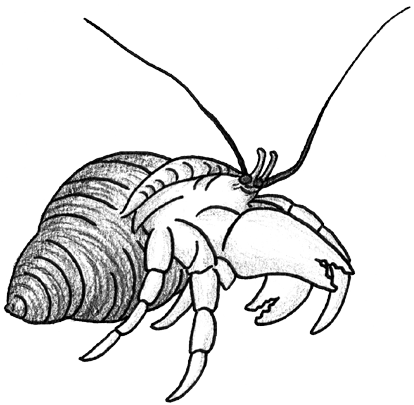
MotagatouPNCV, POc*katou
Fauna
hermitcrab, a small crustacean that lodges inside inside shellsPagure ou Bernard-l'ermite, petit crustacé qui se loge dans des coquillagesPagurus spp.📙 On le donne en appât aux poissons pour la pêche à la ligne (yapyap). Dans les contes animaliers, il a parfois le rôle de la petite bête fragile mais maline.
📘 Given to fish as bait in line fishing (yapyap). In animal fables, it sometimes plays the role of a fragile, but crafty animal.
na-gtē teteh noun
pagure de mer (?)grand Bernard-l'ermiteAniculus maximus.
ÉtymologieLa forme te-teh est sans doute une trace archaïque de POc *tasik ‘mer’, disparue ailleurs.
g[ē]vēg gan tamat na-gvēg gan tamat naɣ̞βɪɣ̞antamat noun
Bot
1 – Malay-apple for the Spiritsunedible, wild variety of Syzygium (na-gvēg), bsl. Wael-kavikapommier-canaque pour les Espritsvariété sauvage, non comestible, de Pomme canaque (na-gvēg), bsl. Wael kavikaSyzygium spp.
gēy nē-gēy nɪɣ̞ɪj noun
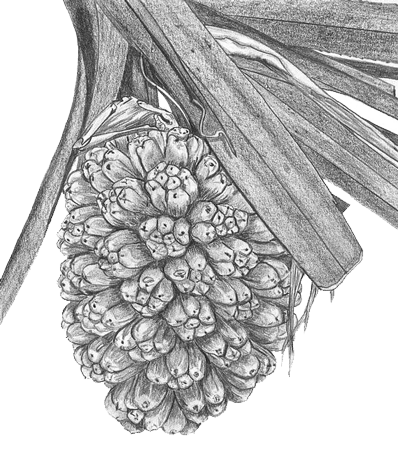
MotagirePNCV, POc*kiʀePandanus tectorius
| Nē-gēy vitwag tig tō a– le-mtehal a yow ale en.There is a pandanus on the roadside, towards the shore over there.Il y a un pandanus au bord du chemin, là-bas vers la côte. |
seega-vag
gēybak nē-gēybak nɪɣ̞ɪjᵐbak noun
📙 Arbre assez solide pour fournir les piliers (na-han̄) dans la construction de maisons
gēymet ɣ̞ɪjmɛt adjective
1 – nutsripe, ready to eatnoix, amandesmûr
| Na-wtag mal gēymet.The Barringtonia nuts are ready.Les navelles sont mûres. |
seemet ②
-gi ɣ̞i suffix
suffixed to certain bound determinersinanimate anaphoric suffix: 'of it'suffixé à certains déterminants liéssuffixe anaphorique pour les inanimés
| bahne-githe last (of it)le dernier |
| vōyōne-githe secondle second |
| na-gayte-gihalf (of it)la moitié |
| na-tvel-gia pieceun morceau |
| tekel-gi ~ taval-githe other side (of it)de l'autre côté |
gil ɣ̞il transitive verb
Redupgilgil
A
1 – affected objectdig, excavate ‹ground›, hollow out ‹wood›objet affectécreuser dans la matière (bois, terre+)
2 – effected objectmake ‹hole›, dig ‹grave+›objet créécreuser ‹trou, tombe+›
| gil na-qyan̄dig a hole (a pit, a grave)creuser un trou / une fosse / une tombe |
3 – dig out ‹tubers›, hence harvestdéterrer ‹tubercules›, d'où récolter
gil yak transitive verb
remove by diggingdig out ‹s.th.›ôter en creusantdéterrer
| Ige tamat kēy van gil yak n-et mat: gil nu-quy nonon, lep yak na-vay nonon ewa tō kēy gen.Ghosts can dig out corpses: they dig a grave, remove the liver, and eat it.Les fantômes viennent déterrer les morts: ils creusent sa tombe, puis arrachent le foie et le dévorent. |
Bintransitive verb
1 – rainthe rain digsfall heavily, so as to dig the ground; rain heavilypluiela pluie creusetomber dru, au point de creuser le sol; tomber à verse
| Na-sm̄al ni-gilgil, ne-len̄vayvay ni-twoh, nē-vēl ni-vēl.The rain was falling heavily, thunder was roaring, flashes were flashing.La pluie tombait à verse, la foudre grondait, les éclairs jaillissaient. |
g‹i›li~ ni-gli niɣ̞li noun, relational
3sgnē-glē-n
gin ɣ̞in transitive verb
PNCV*kini-tipinch, nipPOc*kinitpinch off with fingers, nip with fingernails
pinch ‹s.th, s.o.› between the thumb and indexpincer ‹qqch, qqn›, avec le pouce et l'index
| Gin gin i gen erhymePinch the antcomptinePince pince la fourmi |
gin ne-m̄el phrasal verb
Anthropology
tear off the cycadcount days by tearing off, one by one, the leaflets of a cycad palm (ne-m̄el), used as a calendarcueillir le Cycascompter les jours en arrachant une à une les folioles d'une palme de Cycas (ne-m̄el), utilisée comme calendrier
| Imam nonon gin ne-m̄el van nō-qōn̄ son̄wul nen en, e tō kē ni-van lok me.His father picked off one by one the leaflets of his Cycas for ten days, then he came back.Son père détacha une à une les folioles de son Cycas pendant dix jours, puis il revint vers lui. |
synonymhap ne-m̄el
gismamat ɣ̞ismamat
Motagismamateget ready beforehand, prepare overnight
Atransitive verb
formal registerprepare ‹collective meal, feast›registre formelpréparer ‹repas collectif, fête›
Bintransitive verb
complete preparation, spec. for a collective meal or feastaccomplir tous les préparatifs, spéc. pour un repas collectif ou une fête
| Gēn so gismamat ēgēn.Now's the time to start preparing (for the feast).C'est le moment de commencer les préparatifs (pour la fête). |
Cnounni-gismamat
preparation for a feastpréparatifs d'une fête
| Na-tamn̄a en, gēn te-vet yosveg vēh lō-qōn̄ vitwag woy ēwē, yakhagyeh a bi-gismamat be-leg.Sometimes we weave a large number of mats in a single day – especially when we prepare for a wedding.Les nattes, il arrive qu'on en tresse un grand nombre en une seule journée – en particulier lors des préparatifs d'un mariage. |
gityak ɣ̞itjak intransitive verb
Redupgitgityak
man, animalrun, run awayhomme, animalcourir, partir en courant
synonymvalag
goh ɣ̞ɔh transitive verb
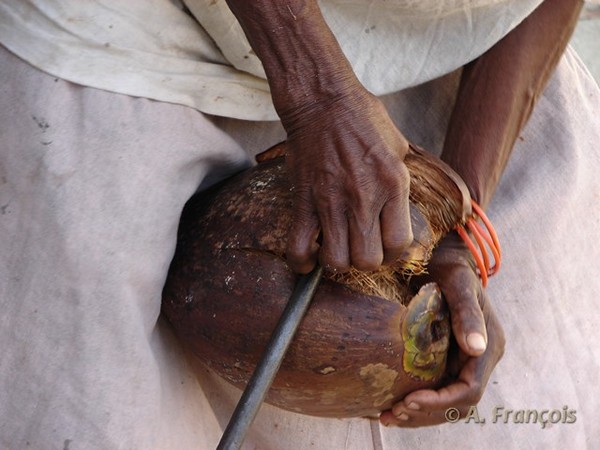
PNCV*koso-mito husk a coconutPOc*kojomhusk (coconuts); husking stick
Redupgogoh
golgol ɣ̞ɔlɣ̞ɔl intransitive verb
PNCV*kolowither
leaf, plantwither; go yellowfeuille, plantefaner, jaunir
gom ɣ̞ɔm
Motagopato be sick, ill
Aadjective
Redupgomgom
(fall or be) ill(tomber ou être) malade
| Nēk tiple gom aē.Be careful not to fall ill.Attention de ne pas tomber malade. |
| No-momyiy m-ak no, nok so gom.I'm cold, I'm going to be ill.J'ai froid, je vais tomber malade. |
| Kē mo-gom e tō kē ni-mat.He died of illness [He was ill and then he died].Il est mort de maladie [Il était malade et puis il est mort]. |
gon1 ɣ̞ɔn adjective
PNCV*konabitterPOc*(ŋ)kona
drink, foodbitter; tasting badnourriture, boissonamer, aigre ; qui a un mauvais goût
| Ne-gengen gōh kē no-gon naw.This food is bitter (like) salt!Ce plat est amer (comme le) sel ! |
| Na-ga kē no-gon!Kava has a strange taste.Le kava, ça a un goût bizarre. |
gon2 ɣ̞ɔn
Motagonaentangled, intricate; difficult; engaged, occupiedPNCV*konacaught, tangled
Aintransitive verb
1 – s.th.be stuck, trapped, accidentally immobilizedqqchêtre bloqué, coincé, accidentellement immobilisé
| Kem hag day so nō-mōmō so ni-gon lelo qen.We're waiting for the fish to come and get caught in the net.On attend que le poisson vienne se prendre dans le filet. |
| Ēt! Ne-qen mo-gon le-vetvet!Ooh! The net's caught in the rocks!Aïe ! Le filet s'est pris dans les rochers ! |
Bintensifier
Intensifier of the vb mētēmteg 'be afraid, frightened. cf. Eng. "to death" in “frightened to death”Intensificateur du vb d'état mētēmteg ‘avoir peur, être effrayé’. Cf. fr. “bleue” dans “une peur bleue”
| No ne-mtēmteg gon na-bago.I'm dead frightened of sharks!J'ai une peur bleue des requins ! |
gon3 ɣ̞ɔn transitive verb
1 – drive a long pointed object (e.g. assegai) into ‹a larger object›: stab, spear; drive into, pierce, punctureenfoncer un objet long et pointu (ex. sagaie) dans ‹un objet plus large›: poignarder, harponner ; ficher, planter, transpercer
| Kēy mo-gon Jises.They struck Jesus with a spear.Ils ont frappé Jésus d'une lance. |
| Gon bat ni-vinhe tiwag mi nē-qētah, tō na-ptōy nan ni-m̄lō.You dig a rod [cf. nē-qētah] into the bamboo in order to split the knots.On enfonce une perche [cf. nē-qētah] dans le bambou, afin d'en transpercer les nœuds. |
| Luw na-qyan̄, tō gon maymay nō-tōti han̄, kē taple mōmōgēg.You dig a hole, then you push the pillar into it firmly [na-han̄], to stop it from swaying.On creuse un trou, puis on y enfonce solidement le pilier [na-han̄], pour l'empêcher de branler. |
SémPour gon, l'agent ne lâche pas l'objet pointu (opp. kay ‘décocher ‹flèche›’, es ‘lancer ‹sagaie, couteau›’); il l'enfonce en le tenant d'une main (opp. wōq ‘enfoncer des deux mains’). Enfin, gon implique que l'objet large est transpercé de part en part (opp. hig).
gon goy transitive verb
Techniques
rarestickcloseclose ‹door, lock› securely by pushing a long object into another; bolt, padlock (opp. vēhbeg goy, close with a simple catchrareenfoncer fermerfermer solidement ‹porte, cadenas› en enfonçant un objet long dans un autre ; verrouiller, cadenasser (opp. vēhbeg goy, fermer par simple accrochage)
| Gon goy galsi na-mteēm̄!Bolt the door properly!Verrouille bien la porte ! |
seetabegfermershut
Techniques
2 – esppress ‹the ground› down with a heavy stick held in both hands, where a post is to be erected (vētgiy), e.g. when building a housepartictasser ‹la terre› à l'aide d'un bâton lourd tenu à deux mains, à l'endroit où l'on est en train de dresser (vētgiy) un poteau, ex. dans la construction d'une maison
| Vētgiy na-han̄, tō gon nē-vētan ēgēn.Once you've erected your post, you press the earth down (around it).Après avoir dressé ton poteau, tu tasses la terre (autour). |
📙 Le but de ce geste est de raffermir le sol à cet endroit, et donc éviter la chute du poteau.
gongon ɣ̞ɔnɣ̞ɔn
Redup. gon ②
Aadjective
rares.o.busy, tied up with another activity, occupiedrareqqnpas libre de son temps, empêché par une autre activité, occupé
| Dō so muwumwu, ba veg no no-gongon.I'd like us to work together, but I don't have the time.J'aimerais bien qu'on travaille tous les deux, mais je n'ai pas le temps. |
📙 Souvent remplacé par l'emprunt bisi angl. busy.
gonteg ɣ̞ɔntɛɣ̞ postverb
Motagonatagto secure as by tyingPNCV*konacaught, tangled
only found in former compound ōlgontegoy “officially appropriate ‹s.th.› for oneself”uniquement dans l'ancien composé ōlgontegoy “s'approprier officiellement ‹qqch›”
gop °na-gop naɣ̞ɔp noun
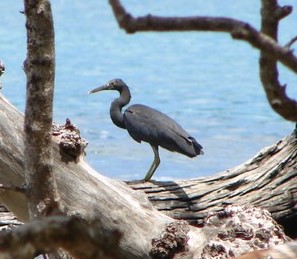
| Koloyni na-Gop, na-n̄ye en ne-heyhey ne-mlēmlēg.rhymecomptineÔ joli Héron, ton bec est pointu et tout noir. |
Got no-Got (nɔ)ᵑgɔt
Ḡot
no-Ḡot
noun
Eng.God
Christianity
1 – the Christian Godle Dieu des Chrétiens
| Na-Tmat so ni-vōy Ḡot den na-myam gōh.Satan wanted to expel God from this world.Satan voulait faire disparaître Dieu de notre monde. |
synonymYatmangēn
2 – god, major deity. Sometimes equated with Iqet, the god figure of the Banks mythologydieu, divinité. Parfois employé pour Iqet, la figure démiurgique de la mythologie des îles Banks
| Ba Iqet en, qele so ikē no-Got non ige ta-Bankis.Ikpwet, so to speak, was the God of the Banks people.Ikpwet, pour ainsi dire, c’est le Dieu des îles Banks. |
| Iqet en, Ḡot ēanen! Ige kastom wa ige tē-n-ēte a m-ōlōl tō a so Iqet.Ikpwet is simply God. It was our ancestors who gave him the name of Iqet.Ikpwet, c'est tout simplement Dieu. Ce sont nos ancêtres, ceux d'autrefois, qui l'avaient appelé Iqet. |
goy1 ɣ̞ɔj postverb, transitive
Motagoropreposition of motion towards, around, against…PNCV*korosurround, cover, obstruct ; shelter, enclosurePOc*korofenced-in area; settlement fortified by barrier
always suffixed to a verb Vtoujours suffixé à un verbe V
Schéma gén.un sujet A recouvre un objet B au moyen d'un objet couvrant C, spéc. de telle sorte qu'il empêche, volontairement ou non, une tierce personne D d'accéder à B. D'où A interpose C pour protéger B et/ou pour repousser D. Les divers sens de goy résultent en partie des diverses combinaisons entre ces éléments
Gen. patterns.o. (A) protects stg (B) by means of a covering object C, esp.in such a way to prevent, purposely or not, another person (D) from reaching B. Hence A interposes C to protect B and/or to keep away D. The various meanings of goy are a result of the combinations between these elements
1 – A,B,Ccover, envelop, shroud, encircle ‹s.th.› with a surrounding object, the latter being specified in the sentenceA,B,Ccouvrir, recouvrir, entourer, ceindre ‹qqch› avec un instrument enveloppant, la nature de cet instrument étant explicitée
| Na-tmatwoh, lep no-yot tō yēt goy na-mtan.For the big drum, take some sago leaves and tie them together (yēt) so as to cover (goy) its opening.Le grand tambour, on prend des feuilles de sagoutier et on les attache (yēt) de façon à couvrir (goy) son orifice. |
| Hey goy ni-qti mi na-hat anen!Protect your head with your hat!Protège-toi donc la tête avec ce chapeau ! |
2 – A,B,(C)cover, envelop, shroud, encircle ‹s.th.› with a surrounding object, the nature of which is suggested by the verb VA,B,(C)couvrir, recouvrir, entourer, ceindre ‹qqch› avec un instrument enveloppant, dont la nature est suggérée par le verbe V
3 – A,B,(C)cover, block, hide: V implies that A covers B with a part of his body (hig 'with the finger', tēy 'with the hand')A,B,(C)recouvrir, boucher, cacher: V implique que A couvre B avec une partie de lui-même (hig 'avec le doigt', tēy 'avec la main')
| Nok tēy goy nē-dēln̄ek.I block up my ears (with my hands).Je me bouche les oreilles (avec les mains). |
| Nēk mi-sil goy kē!You put your arms around her!Tu l'as prise dans tes bras ! |
4 – A=C,Bcover, invade (a place): the covering object is A itself. Cf. Eng. overA=C,Brecouvrir, envahir ‹un endroit›: l'objet couvrant (C) se confond avec le sujet (A). Cf. prépos. fr. sur
| Nō-wōl me-hey goy na-pnō del.The whole village is swamped in moonlight.La lune brille sur tout le village. |
| N-ēm̄ ni-yoq goy ne-men ē-gēn !And then the trap closes in on the bird.Alors le piège s'effondre sur l'oiseau. |
| Ige van wolat goy na-mtehal.People are crossing the street.Les gens traversent la rue. |
5 – A,B=Ccover stg with itself, hence: close, shut; fasten; put together, joinA,B=Ccouvrir une chose avec elle-même, d'où: fermer, refermer ; boucler ; joindre, rejoindre
| qul goy no-totgalstick together a photorecoller une photo |
| gon goy na-mteēm̄bolt the doorverrouiller la porte |
| Lok hōw, kē ni-van qal goy mey lok hag.The west is joining the east.Le côté ouest va rejoindre le côté est. |
| Kē ni-yam goy lok me.She pays back her debt to me.Elle règle sa dette envers moi. |
6 – A,B,(C),Dpurposely or not, act or find oneself in such a position (verb V) to hide an object (B), thus preventing someone (D) from seeing it or reaching it; hence block, occupy, trust; hide ‹s.th.›, preserve, protect ‹s.th.› (from, against: den) [Obj=B] A,B,(C),Dde façon volontaire ou non, agir ou se trouver dans une telle position (verbe V) qu'on occulte un objet ‹B›, empêchant du même coup une personne (D) de le voir ou d'y accéder; d'où bloquer, occuper, monopoliser ; cacher ‹qqch›, préserver, protéger ‹qqch› (contre D, den D) [Obj=B]
| Nēk ma-tan̄ melmel goy nō-bōk.Your hand (tan̄) is casting a shadow (mel) over my notebook.Avec ta main (tan̄) tu fais de l'ombre (mel) à mon cahier. |
| Nēk ma-hag goy na-tnēk!You're sitting in my seat [you sit-block my seat]!Tu es assis à ma place [tu es assis-bloques ma place] ! |
| In̄glan, na-naw na-hal goy.England is an island [the sea floats-blocks].L'Angleterre est une île [la mer flotte-bloque]. |
| Ige mayanag mi-hig goy na-tmat so kē nitog leplep.The chiefs protected the masks by preventing (the tourist) from taking them away.Les chefs ont protégé les masques en empêchant (le touriste) de les emporter. |
7 – A,B,‘C’,(D)protect ‹s.th.› from others by pronouncing ritual words; reserve (stg, sb, a place) by marking it as one's property, appropriate; render holy or taboo; consecrate, blessA,B,‘C’,(D)protéger ‹qqch› du contact d'autrui, en employant des paroles consacrées ; se réserver ‹objet, personne, endroit› en le marquant comme sa propriété, s'approprier ; rendre sacré ou tabou ; bénir
| No mē-vēg goy so na-kis.I reserved it for myself (to eat, kis).Je me le suis réservé pour moi (à manger, kis). |
| Kem van ak goy na-lqōvēn.We're going to celebrate (my son's) engagement.Nous allons faire des fiançailles (pour mon fils). |
| salsal goy n-ēm̄mark one's private property on one's home [by hanging stg on it, sal]marquer sa propriété privée sur sa maison [en y accrochant qqch, sal] |
| Ige qagqag kēy mi-lilip goy Numea.New Caledonia was colonised by Whites.La Nouvelle-Calédonie a été colonisée par les Blancs. |
8 – A,Bact (V) so as to protect, obtain, master ‹s.th.›; have a dominant position over; act for ‹s.th.›A,Bagir (V) de façon à protéger, obtenir, contrôler ‹qqch› ; avoir une position dominante sur ; agir sur, agir par rapport à ‹qqch›
| Kem mitiy goy ni-mit.We're keeping watch over the meat [sleep on it, mitiy].Nous, nous surveillons la viande [en dormant, mitiy]. |
| Kē no-wotwotm̄ag goy kemem.He's the eldest of ("over") us all.Il est l'aîné de [litt. sur] nous tous. |
| Magra kē ni-lwo goy na-gmel agōh.Magra runs [who is ‘big over’] this kava-bar.C'est Magra qui dirige [qui est ‘grand sur’] ce bar à kava. |
| No no-bos goy mahgēk !I am my own boss (I am free to do whatever I want).C'est moi qui suis mon propre patron [bos] (je suis libre de faire ce que je veux) |
| Na-Tmat m-aksok so kē ni-wuh Iqet, so kē ni-lwo goy a na-myam kē.Satan tried to kill God, in order to rule the world.Satan cherchait à tuer Dieu, pour devenir le maître du monde. |
📙 Cf. [V+goy] avec V: liwo, welan, bos ; wotwotm̄ag ; mitiy.
📘 Cf. [V+goy] with V: liwo, welan, bos; wotwotm̄ag; mitiy.
9 – A,Bact esp. go find ‹s.th.›, go fetch ‹s.th., s.o.›A,Bagir et spéc. se déplacer pour obtenir ‹qqch›, aller chercher ‹qqch, qqn›
| Na-trak so ni-van goy na-mtewot!We need a car to go and fetch an injured man!Il faut une voiture pour aller chercher un blessé ! |
| Kēy tēvēy goy nō-mōmō.They are diving for fish.Ils plongent chercher du poisson (ils font de la pêche sous-marine). |
| Nok vēhge goy ne-gengen na-ga-mem.I'm going to find out about (goy) the meal we're going to eat.Je vais me renseigner sur (goy) le repas que nous allons manger. |
10 – A,Bact (V) so as to take care of (sb); look after, nurse; help; maintainA,Bagir (V) de façon à prendre soin de ‹qqn› ; s'occuper de, soigner ; aider ; entretenir
| Nēk haghag goy qōtō Makmak veg kē mo-gom.Come and sit with Makmak, he's ill.Viens t'asseoir un moment auprès de Makmak, il est malade. |
| No me-tron̄, ay! Nēk te-pkasteg goy vēh no?I think I'm sloshed! Can you help me (get back home)?Je suis bourré, dis donc ! Tu peux venir m'aider (à rentrer chez moi) ? |
| Na-mtig non Wotlōlan, kē no-dowdow goy vaga.Wotlôlan always looks after his coconut trees [by weeding around them, dowdow]Wotlôlan entretient toujours très bien ses cocotiers [en désherbant autour, dowdow] |
11 – Benefactive value: act in favour of ‹s.o., s.th.› cf. Eng. “for, because of”. Goy behaves like an applicative morphemeA,‘B’valeur Bénéfactive: agir en fonction de ‹qqn, qqch›: cf. fr. “pour, à cause de”. Goy se comporte alors comme un morphème de diathèse applicative
| Kē me-qneg goy nēk.She's jealous for you, because of you.Elle est jalouse pour toi, à cause de toi. |
| No mo-boel goy intik (≠ No mo-boel inti-k).I'm angry over my son (≠I'm angry at my son).Je suis en colère pour (défendre) mon fils (≠Je suis en colère contre mon fils). |
| Tjibau kē so ni-pgal goy na-pnō nonon.Tjibaou combattait pour (défendre) son pays. |
| Nok dēmdēm goy nēk aē.I'm worried about you.Cela me rend inquiet pour toi. |
| Dō mal kaka goy.Nous avons déjà parlé de cela. |
| Tita noyō en ni-ten̄ten̄ goy kōyō van, ni-mlaklak goy kōyō.Their mother welcomed them with tears of joy. [lit. she cried for them, she was happy for them]Leur mère les accueillit avec des larmes de joie. [litt. elle pleurait pour eux, et se réjouissait pour eux] |
seedēmdēm goys'inquiéterworry
12 – A,(B),Dpurposely or not, act or find oneself in such a position (V) that one hinders sb else (D), by preventing him from doing or getting stg (B). Hence: interfere against; retain, prevent; refuse a right to, forbid (sb) [Obj=D]A,‘B’A,(B),Dde façon volontaire ou non, agir ou se trouver dans une telle position (V) qu'on gêne une personne ‹D›, en l'empêchant d'agir, ou d'accéder à qqch (B). D'où: s'interposer contre ; retenir, empêcher ; refuser un droit à, interdire à ‹qqn› [Obj=D]
| Roland kē ni-tēytēy goy kōyō.Roland stopped them (from fighting).Roland les a empêchés (de se battre). |
| Kēy mi-tig goy kē hag le-tno baklap gapgap en.They stood in his way at the airport (to prevent him from leaving).C'est là-bas, à l'aéroport, qu'ils lui ont barré la route (pour l'empêcher de partir). |
| Nok hig goy kōmyō so kōmyō tele vanvan hep na-n̄ye mey gēn.folktaleI forbid you from going further than the headland over there.conteJe vous interdis d'aller plus loin que la pointe de terre là-bas. |
13 – A,Dact secretly, without sb's knowledge; keep sb out of the way of one's movements or conversation; plot againstA,Dagir secrètement, à l'insu de ‹qqn› ; tenir à l'écart de ses actions ou de ses paroles ; comploter contre
| Dō hole lon̄veg goy Edga!Let's talk so that Edgar doesn't hear us!Parlons de façon à ne pas être entendus d'Edgar ! |
14 – A,DDetrimental value: hinder, bother ‹s.o.›; cf. “prevent”A,Dvaleur Détrimentale: agir de façon gênante, importuner ‹qqn› ; Cf. sens “empêcher”
| Nitog wowow goy no.Stop annoying me!Arrête de me déranger ! |
| Nok hel goy no-hohole nonmoyō.I interrupt you.Je vous interromps. |
| Na-naw t-ōy goy no.The sea will keep me away (from you).L'océan me séparera (de vous). |
| Nē-bē ma-mah goy kēy.The river dried up on them.La rivière les a surpris en baissant soudain de niveau. |
| Tateh age het ni-van goy me.No problem ! [nothing bad coming].Pas de problème ! [Aucun ennui qui survienne]. |
seesiseg goyse jouer deplay around
15 – espA,‘D’if V expresses an event in time, goy adds the notion that this event interrupts an ongoing actionspécA,‘D’si V exprime un événement temporel, goy indique que cet événement vient interrompre une action
| Le-Krismas en aa, kem ma-laklak e laklak ee mahē me-myen goy!Last Christmas, we danced and danced until dawn! [lit. the dawn came on it].À Noël dernier, nous avons dansé, dansé, jusqu'au petit matin! [litt. le jour s'est levé] |
| Mahē tō-qōn̄ goy qiyig dōyō!transitive[lit. night will fall on us] It's going to take us all day! (so let's not start now)transitif[litt. la nuit va tomber sur nous] Ça va nous prendre toute la journée (donc ne commençons pas maintenant) ! |
16 – A,‘D’time, years+go byA,‘D’temps, annéespasser
| N-ēte mal m̄adeg goyThat was many years ago [lit. years have been many since]C'était il y a de nombreuses années [litt. les années ont été nombreuses depuis] |
| Dō ma-kaka gatay tō en, et-misin goy qete en!negative contextBut we just barely talked about it! [lit. we talked about it, it hasn't yet been long since!]contexte négatifMais on vient tout juste d'en parler! [litt. nous en avons parlé, il ne s'est pas encore écoulé longtemps depuis !] |
17 – A,(B),(C),‘D’do stg (V) in reaction to an event, react; do stg to counteract or cancel the negative effects of another action. E.g. after drinking kava, eat (gen) stg to take away the taste; the complement of the compound gen goy can either be what one eats (C), or kava (D), or the mouth itself (B)A,(B),(C),‘D’faire qqch (V) par réaction à un événement, réagir ; faire une action pour compenser ou annuler les effets néfastes d'une autre action. Ex. après avoir bu le kava, manger (gen) qqch pour en enlever le goût ; le groupe gen goy a alors pour objet soit ce que l'on mange (C), soit le kava (D), soit la bouche elle-même (B)
| ne-gengen so gen goy na-ga aē. / so gen goy na-ple.food to eat 'over' (counteract) kava/to eat 'over' (relieve) your mouth.de la nourriture pour manger 'sur' (compenser) le kava./ pour manger 'sur' (soulager) ta bouche. |
| Kēy mōkheg goy ne-legleg.They are resting (following) the wedding ceremonies (which exhausted them).Ils se reposent (à la suite) des fêtes de mariages (qui les ont épuisés). |
| tēngeg goy n-ēm̄support a house which might fall down (using a buttress)soutenir une maison qui risque de s'effondrer (à l'aide de contreforts) |
18 – A,‘D’act alternately with sb else; respond to sb's action by another, whether once only or repeatedlyA,‘D’agir en alternance avec qqn d'autre ; répondre à une première action d'autrui par une seconde action, que ce soit de façon unique ou répétitive
| Nok ti, kēy ti goy.I sing first, then they sing back.Je chante d'abord, puis ils chantent en réponse. |
| Nēk tēy goy, ba kē ni-in.While you're holding (the cup), he drinks.Pendant que tu tiens (la coupe), il boit. |
| Nok yem n-aranis, ba nēk sekeske goy.I'll climb up the orange tree and you catch (the fruit).Moi je grimpe sur l'oranger, et toi tu réceptionnes (les fruits). |
| Nok vap na-vap t-am̄ag, ba nēk sese goy n-eh nan.I'll tell the story, and you sing the song.Moi je raconte le conte, toi tu en chantes la chanson. |
| Sowo kēy ne-mlaklak goy...If they're happy about it...S'ils en sont contents... |
19 – espexecute a particular dance at the same time as a certain music; dance tospéc(exécuter telle ou telle danse) en même temps que ‹une certaine musique›; (danser) sur
| Ige tam̄an haw goy na-hek.The men dance the no-yon̄yep to my song (in my honour).Les hommes viennent danser le no-yon̄yep sur ma chanson (composée en mon honneur). |
20 – A,‘D’behave in a particular manner (V) systematically, reacting to sb else's repetitive behaviourA,‘D’avoir tel ou tel comportement (V) de façon systématique, en réaction à une action d'autrui, elle-même répétitive (Cf. Rédup.) ; d'où valeur de répétition
| Nēk vavap me, ba na-lēk qōn̄qōn̄ goy.Although you repeat it to me, I forget each time.Bien que tu me le répètes, j'oublie à chaque fois. |
| Kē ni-balbal goy nē-lēn.He always cuts his hair (i.e. each time it's too long)Il a l'habitude de se couper les cheveux (s.-e. à chaque fois qu'ils poussent). |
| Na-plih ni-mtomtow aē ewa kē ni-dow goy, kē ni-koko goy.Every time the grass grew, he would cut it off, he would weed it.Chaque fois que l'herbe poussait, il l'arrachait, il désherbait. |
goy2 ɣ̞ɔj
Motagorasweep, away or together
Aintransitive verb
Redupgoygoy
Btransitive verb
flood over, submerge ‹place, people›déferler sur, recouvrir, submerger ‹qqch, qqn›
| Na-naw mo-goy kēy.[lit.The sea engulfed them] They were victims of a tidal wave.[litt.La mer les a submergés] Ils ont été victimes d'un raz-de-marée. |
| 1972, ne-len̄wuh liwo, tō na-naw ni-goy na-pnō Avay.There was a giant hurricane in 1972: that is when the village of Avay was submerged by the sea.Lors du grand cyclone de 1972, la mer a submergé le village d'Avay. |
goygoy no-goygoy nɔɣ̞ɔjɣ̞ɔj noun
Fish
Black bream, long-fin bream: huge ocean fishBrème noire, Brème à longues nageoires: gros poisson océaniqueTaractichtys longipinnis.
g[o]yogyo- na-gyogyo- naɣ̞jɔɣ̞jɔ prefix
rareprefix referring to a small fish, added on to the name of the speciesrarepréfixe permettant de désigner un poisson de petite taille, à partir du nom de l'espèce
| na-gyogyo-hōm̄a little Parrot-Fishun petit Poisson-Perroquet |
| na-gyogyo-duwa little Angel-Fishun petit Poisson-Ange |
goy tiwag ɣ̞ɔjtiwaɣ̞ intransitive verb
works like a motion verbhuman crowdsurge togetherflock, move in crowdfonctionne comme un verbe de mouvementfoule humainedéferler ensemblese déplacer en masse
| Ige ta-la-Man̄go goy tiwag vatag hag Sarakata.Everyone from the Mango village goes together to the Sarakata village.Ceux du village Mango se rendent ensemble au village Sarakata. |
| Kemem goy tiwag tēy nēk me.wedding songWe've come here with you as a crowd.chanson de mariageNous sommes venus en foule t'accompagner ici. |
goyveg ɣ̞ɔjβɛɣ̞ transitive verb
clean, rake: pick up ‹grass, sand, rubbish+›nettoyer, ratisser: ramasser ‹herbe, sable, saletés+› sur le sol pour en faire un tas
seem̄ōgtegnettoyer
goy vētgi ɣ̞ɔjβɪtɣ̞i intransitive verb
people, animalssurge in groupflock massively (flock, horde, swarm, etc.)hommes, animauxdéferler en groupese déplacer en foule (en troupeau, horde, nuée, etc.)
| Ige nonon mey na-tm̄an goy vētgi me le-mtēgtap non mey na-lqōvēn.The groom's family hordes together in front of the bride's door.La famille du marié se rassemble en foule devant la porte de la mariée. |
| Ne-men ni-goy vētgi me.The birds are coming in flocks.Les oiseaux arrivent par nuées. |
| Nō-mōmō goy vētgi tō gēn.Fish swim in shoals.Les poissons évoluent par bancs entiers. |
gōh ɣ̞ʊh
gōs
deictic
this: non-conclusive demonstrative of first degree, i.e. targeting the sphere of the speakerceci: démonstratif non-conclusif du 1er degré, c-à-d. ancré sur la sphère du locuteur
SyntaxeDémonstratif non-conclusif, placé en milieu d'énoncé déclaratif (ex. fin de thème) ou en fin d'énoncé non déclaratif (question, ordre, exclamation). L'équivalent conclusif est agōh (en fin d'assertion).
SyntaxNon-conclusive demonstrative, found in the middle of statements (e.g. topic phrase), or at the end of non-statements (questions, orders, exclamations). Its conclusive counterpart – found at the end of statements – is agōh.
1 – this one here, close to the speakerceci, proche du locuteur
| Yē ma-yap tō nō-mōmō gōh?Who caught this fish? (I'm holding ~ showing)Qui a pêché ce poisson? (que je tiens ~ que je montre) |
| N-et aē l-ēm̄ gōh?Is there anyone in this house?Il y a quelqu'un dans cette maison? |
| Ige lōqōvēn hag geh tō hay gōh, kēy kukuk ēnōk ?The women sitting inside here, are they cooking?Ces femmes assises ici, font-elles la cuisine ? |
2 – temporal meaningnowsens temporelmaintenant
| sisqet (a)gōh right nowmaintenant |
| l-ēte gōhthis yearcette année |
derivativetō gōh
3 – predicate + gōhthis is an (N): forms noun predicatesprédicat + gōhc'est un (N): forme des prédicats nominaux
| Et-imam nōnōm te gōh! Mey gōh imam mino tiwag mi tita mino!This is not your father! These are my parents!Ce n'est pas ton père ! (Ceci) ce sont mes parents à moi ! |
📙 Plus souvent dans la forme conclusive agōh.
📘 More often in the conclusive form agōh.
g[ō]hōw na-ghōw naɣ̞hʊw

MotagasuwePOc*kasuperat sp., probably Rattus exulans
gōm °na-gōm naɣ̞ʊm
nagōm
possessive classifier
Grammar
your, for you: 2sg form of Food possessive classifier ga~ ③ton, ta: forme 2sg du classificateur possessif des Comestibles ga~ ③
main entryga~ ③
1 – literal(food) for youlittéral(à manger) pour toi
| Nēk so gen te gōm ?partitiveDo you want some?partitifTu en veux ? |
gōygōyi~ nō-gōygōyi nʊɣ̞ʊjɣ̞ʊji noun, relational
Redup. gōyi~
3sgnō-gōygōyēn

Flora
1 – plantrootplanteracine
| nō-gōygōyi gēvēgthe roots of the apple treeles racines du pommier |
| nō-gōygōyi qētēnge vitwagroots (of a tree)une racine (d'arbre) |

